CEsA E-books
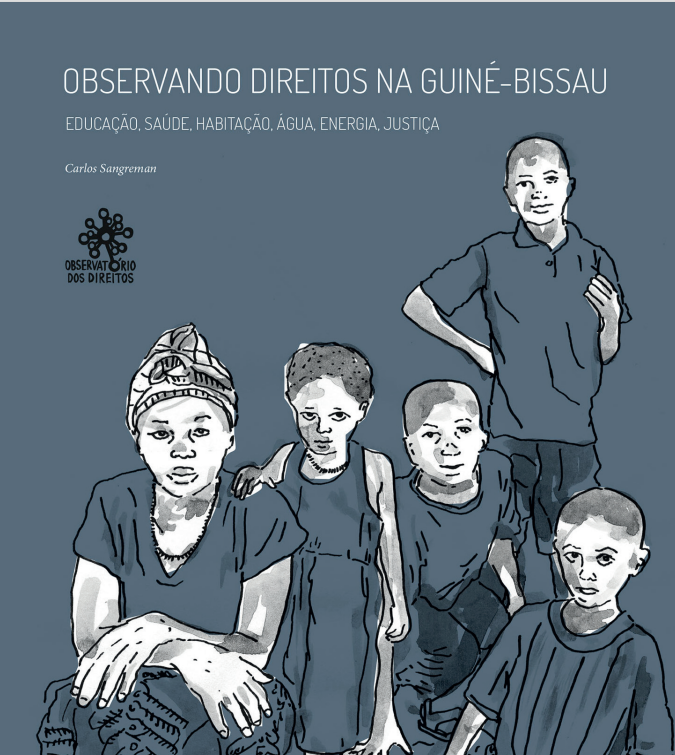
Observando Direitos na Guiné-Bissau: Educação, saúde, habitação, água, energia, justiça
Quotation:
Sangreman, C. (2015). Observando Direitos na Guiné-Bissau – educação, saúde, habitação, água, energia, justiça. Lisboa: ACEP, com LGDH e CEsA. ISBN 978-989-8625-07-6.
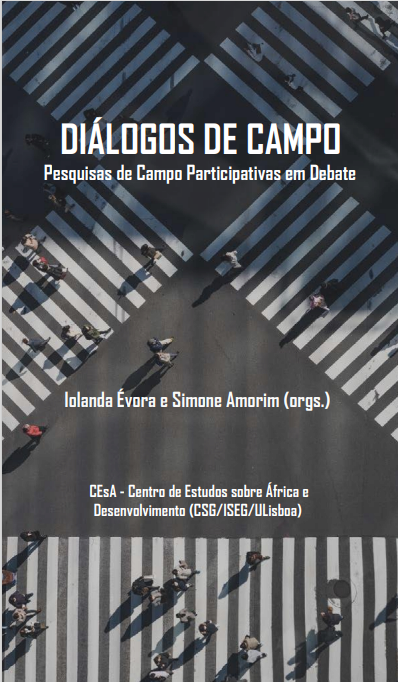
Diálogos de Campo – Pesquisas de Campo Participativas em Debate
Abstract:
This volume brings together concerns that serve as the basis for a continued debate on the mutual implications of research in the field of Social Sciences. The texts start from the common observation about the weakening of demands about “how we do it” in social research and deal with aspects related to fieldwork that are increasingly losing space in academia, essentially focused on producing results. From the fields of Social Sciences, Cinema, Literature, and Psychology, among others, the themes move between the dimensions of power hierarchies in research and the contexts that exponentiate them; the position and positionality of the researcher, and where we are placed by our interlocutors or people in the situations addressed. Specifically, they reflect on participatory methodologies and changes in knowledge production; ethnography and epistemic decolonization when the researcher does research in their life context; the interferences and determinations dictated by the field, during research; collaborative or participatory research, whether with refugee associations, in the field of artistic training or action research on bicycles and the city. Furthermore, the researcher’s subjectivity and writing regarding anti-racist cinema are addressed; as the implications of the researchers themselves in researching topics such as the impact of the pandemic on women, cultural heritage, or an object present, simultaneously, on different continents. The classic questions of the debate on methodology are present, which are, in fact, the foundations of current affairs, bringing different nuances of the contemporary debate, in social research, at a time when easier access to information reduces the distance and access of society (and the subjects of social research) to the knowledge about themselves produced in academia. This book was designed within the scope of the methodology workshops of the Afro-Port project (FCT/CEsA) and coincides with the project’s objective of contributing to a program in horizontal methodology and grounded methodology that is original, innovative and transdisciplinary, sustained by the interest in dialogue between academic and non-academic/scientific and non-scientific discourse.
Quotation:
Évora, I. e Amorim, S. (2023). “Diálogos de Campo – Pesquisas de Campo Participativas em Debate”. Lisboa, CEsA/CSG. ISBN 978-989-54687-4-4
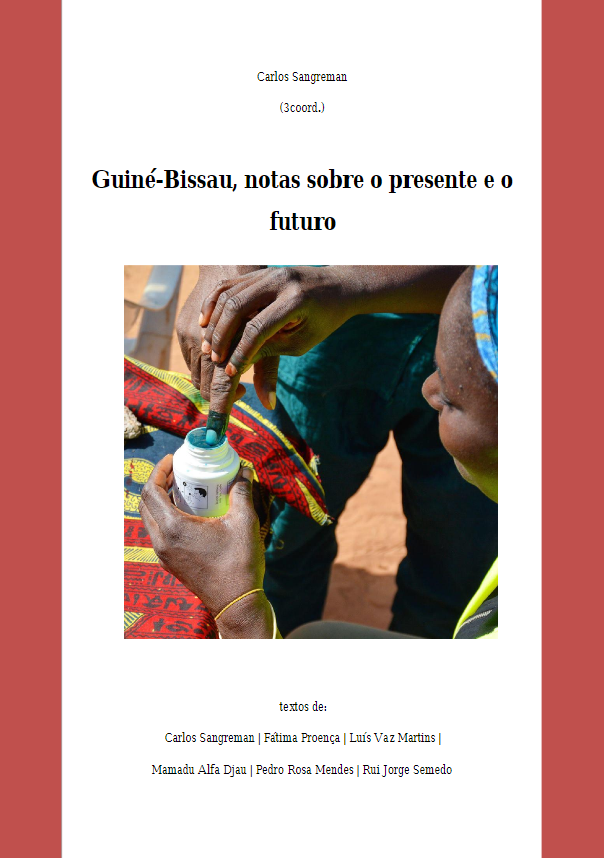
Guiné-Bissau – Notas sobre o presente e o futuro
Abstract:
The idea of publishing the book Notas sobre o presente e o futuro of Guinea-Bissau arose from the need to get to know the country better and to think about its recent past, which will inevitably contribute to its near future. The aim was to collect existing texts that were revised and updated and to ask some authors to reflect on themes based on the motto “Guinea-Bissau, notes on the present and the future”. These texts are published at a special moment in the country. After a period of a government appointed by the military that took power in 2012, elections were held in 2014 and a round table was held in Brussels where the country received a great deal of encouragement from its international partners – institutions and countries – in support of a government and a president that everyone had hoped would provide a more stable and successful evolution such as there had not been until then. But these expectations came up against a conflict between sovereign bodies, which frustrated this support and threw the country into a four-year period of instability that began to end with the legislative elections on 10 March 2019 but is only expected to return to normal institutional functioning with the presidential elections in November of the same year.
Quotation:
Sangreman, Carlos, Fátima Proença, Luís Vaz Martins, Mamadu Alfa Djau, Pedro Rosa Mendes e Rui Jorge Semedo Guiné-Bissau – Notas sobre o presente e o futuro, com, ISBN 978-989-20-9932-3, CESA-ISEG/ULisboa, 2019, Lisboa.
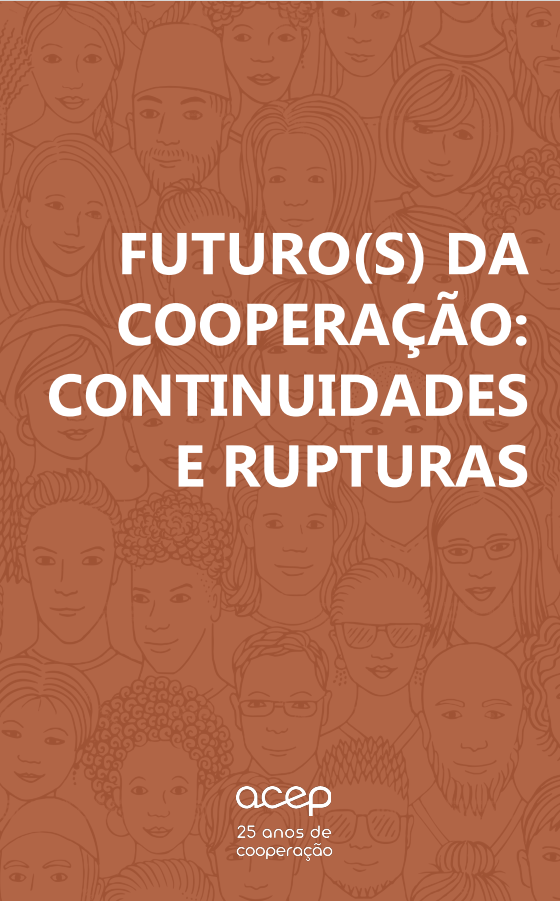
Futuro(s) da Cooperação: Continuidades e rupturas
Abstract:
At a time when a new strategy for Portuguese Cooperation is being defined and profound changes are taking place at the global level, ACEP and CEsA have decided to mark their years of experience in the sector with a document that is intended as a contribution towards evaluating the path of Portuguese Cooperation policy and setting the course for possible futures. In Futuro(s) da Cooperação: Continuidades e Rupturas, in addition to our vision and questions about the policies of Portuguese and European cooperation and the role of civil society, we have also included other voices of partners and specialists, particularly from Africa, which run through the whole document and give it a more plural, multidisciplinary and multi-geographic character. This document was prepared by the ACEP team, within the framework of an advocacy and political influence project, developed in partnership with CEsA (CSG/ISEG/ULisboa), with the support of Camões – Instituto da Cooperação e da Língua. Alongside the rescue of principles and values – in speech and in practice – a serious and uncomplicated discussion must be started on power relations and the ‘delocalisation of aid’, laid bare by the pandemic crisis. This debate, already on the agenda in countries like the United Kingdom, is still absent in Portuguese Cooperation. An approach to the localisation of cooperation as a process of autonomisation implies a process logic, without a fixed time, in which non-financial resources are valued, which allows for a subjective space/time for growth and which lasts beyond this or that funding or project.
Quotation:
Oliveira, A. F., Proença, F., Cavaco, R. (2021). Futuro(s) da Cooperação: Continuidades e rupturas. Lisboa: ACEP e CEsA.
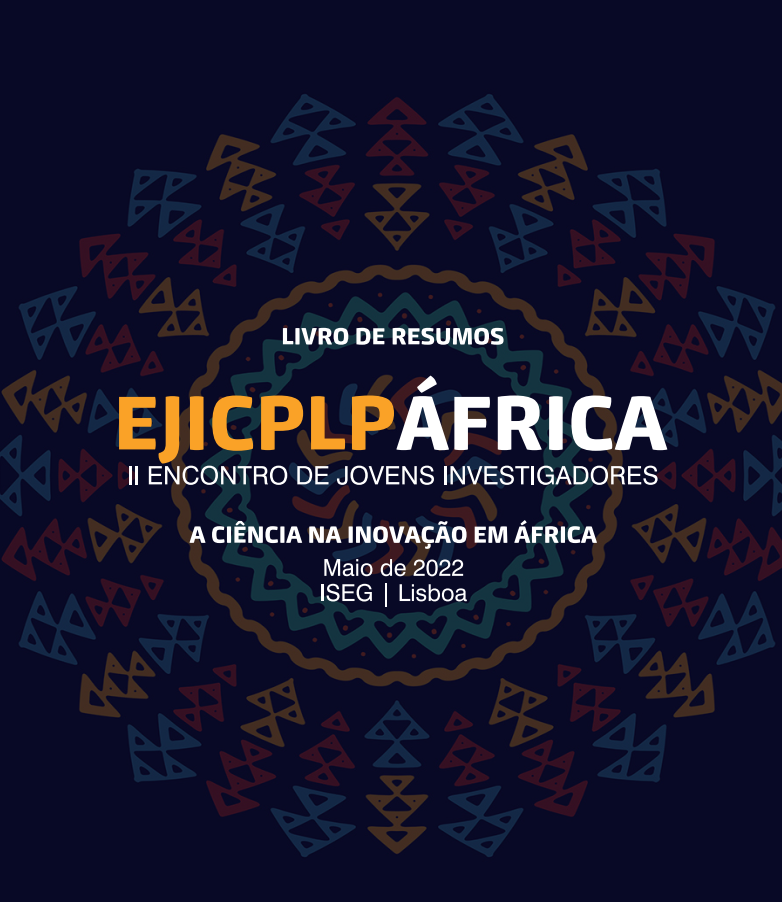
Ebook – EJICPLP Africa: Science in Innovation in Africa
Abstract:
The Meeting of Young Researchers from CPLP on Africa is an inclusive space for debate and scientific dissemination in African studies and in Portuguese language, in an innovative, democratic and multicultural perspective. The success of this project began in 2021, when it was proposed to bring participation and protagonism to young people, as agents of change in a living community in permanent transformation. In this context, the 2nd Meeting was held in May 2022, in Lisbon, where the role of science in innovation in Africa was discussed, exceeding all expectations, whether in the quality of the debates, the excellence and diversity of the works presented, or the massive adhesion of the participants. The Meeting took place thanks to the work carried out by the Organising Committee, an International Scientific Council, with the collaboration of the Centre for African and Development Studies (CEsA), as the proponent entity. in addition to the support of other partner institutions, such as the CPLP, Lisbon City Council (CML), Higher Institute of Economics and Management (ISEG), Catholic University of Angola (UCAN), Union of Portuguese Speaking Capital Cities (UCCLA), Eduardo Mondlane University (UEM – Mozambique), Association of Municipalities for Sustainable Development of the Umbria Region (FELCOS – Italy). The 2º Encontro de Jovens Investigadores da CPLP sobre África – Livro de Resumos was only possible thanks to the collaboration of numerous people, in particular the Organizing Committee, the Scientific Council, the Speakers, the Institutional Partners, the Medias Partners, the Volunteers and the Scientific Community.
Quotation:
D’Abril, Cristina Molares [et al.] (2022). “2º Encontro de Jovens Investigadores da CPLP sobre África. Livro de Resumos”. ISBN: 978-989-54687-3-7
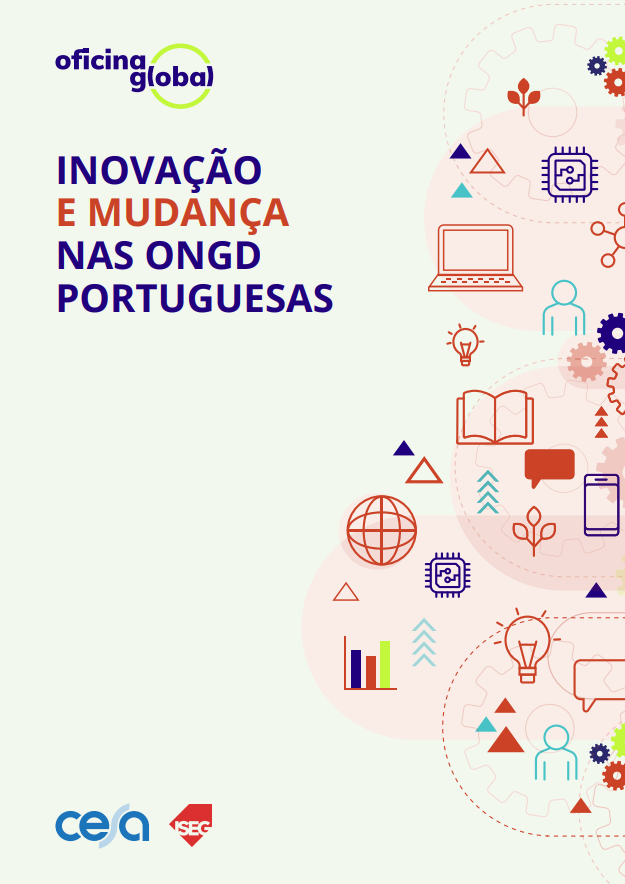
Inovação e mudança nas Organizações Não-Governamentais de Desenvolvimento (ONGD) Portuguesas
Inovação e mudança nas Organizações Não-Governamentais de Desenvolvimento (ONGD) Portuguesas by Ana Luísa Silva and Renata Assis focuses on innovation for development in the context of Portuguese NGDOs. Given the diversity of interpretations that the concept of innovation itself raises, the study began by mapping the perspectives, practices and culture of innovation of the actors under analysis. In this way, we sought to ascertain what is innovation for Portuguese NGDOs? What priority do they give to innovation? What obstacles do they face? And what reasons lead Portuguese NGDOs to wish (or not wish) to innovate?
Abstract:
This study focuses on innovation in the context of International Cooperation for Development (ICD) – innovation for development – from the perspectives of Portuguese Non-Governmental Development Organizations (NGDOs). Given the diversity of interpretations that the concept of innovation can present, any analysis on the subject must begin by identifying the perspectives and practices of the actor(s) under analysis. In this way, the analysis is guided by the questions: what does innovation mean for Portuguese NGDOs? What priority do you give to innovation? What obstacles do you face? What types of innovation do they develop and implement? What reasons lead Portuguese NGDOs to want (or not want to) innovate? As this is the first wide-ranging study on innovation in Portuguese NGDOs, we sought to map the culture, capacity, existing innovation support structures in Portuguese NGDOs and also identify obstacles/constraints to innovation in these organizations. The study was carried out through an online questionnaire survey, which received responses from 46 organizations in the period from November 9 to 26, 2021. The sample included organizations with a wide variety of organizational structures, according to the diversity of the universe of 163 Portuguese NGOs. The survey results show that innovation is very present in the agenda, strategies and priorities of the NGDOs surveyed: for the vast majority (88%) it is a “High” or “Very High” priority in the scope of their work. Respondents show broad and multifaceted perspectives in defining innovation. However, for the NGDOs that responded to the survey, innovation is mainly seen as a tool to improve processes, increase the efficiency and impact of their work. Potentially disruptive innovations capable of leading to systemic change are infrequent in the identified examples. In addition, although they consider themselves innovative, the NGDOs surveyed also identify important obstacles to innovation, namely in terms of funding and available human resources – 73% say they do not have any kind of budget available for innovation. The study ends with a set of reflections and identifies possible ways to help build a context more conducive to innovation for development, particularly in Portuguese NGDOs. It is important that innovation is seen and approached as an approach to building social and systemic change, which is why it is essential to invest in partnerships and joint work. Among the possible paths presented, the creation of a multi-actor working group dedicated to the theme, the creation of a fund to finance innovation projects for development and the commitment to training and training NGDO employees stands out.
Quotation:
Silva, Ana Luísa e Renata Assis (2022). Inovação e mudança nas Organizações Não-Governamentais de Desenvolvimento (ONGD) Portuguesas. Lisboa: CEsA – Centro de Estudos sobre África e Desenvolvimento/ISEG
Access the article here.
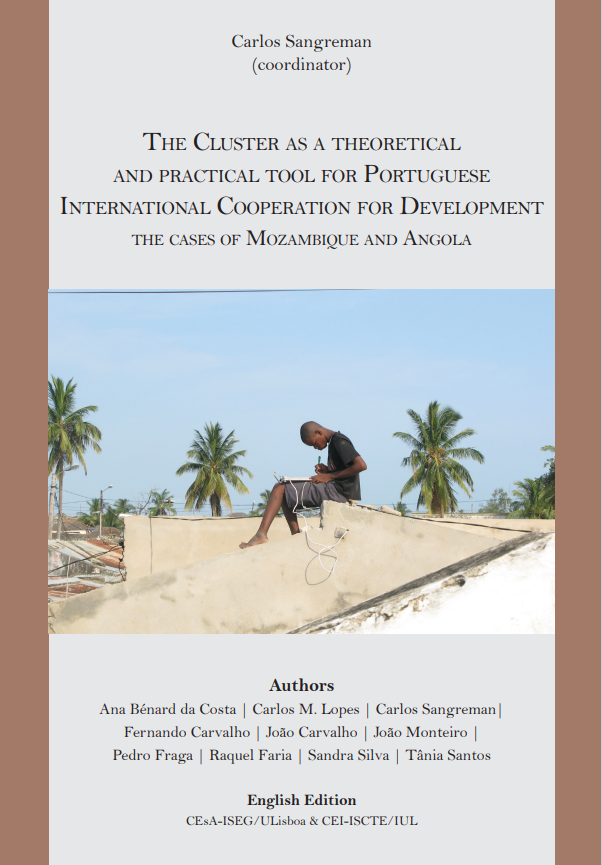
The Cluster as a Theoretical and Practical Tool for Portuguese International Cooperation for Development: The cases of Mozambique and Angola
Abstract:
The Cluster as a theoretical and practical tool for Portuguese International Cooperation for Development: the cases of Mozambique and Angola seeks to provide a contribution towards knowledge of the theory and practical effects of the new instrument in the hands of Portu¬guese cooperation for development – clusters in cooperation – both in re¬gard to the countries receiving international aid and in terms of the effect that its creation and implementation may have, through what we can call the “boomerang effect”, on the reform of public and private cooperation institutions in Portugal, above all at the Instituto de Apoio ao Desenvol¬vimento (the Development Support Institute – IPAD). As for the theoretical side, we maintain that it is only the connection of this concept to benchmarking, as it is taken to mean in the reform of public administration currently underway, that will turn it into a real poli¬cy measure, as opposed to virtual measures that are announced and never put into practice. Then it can provide an innovative contribution to the re¬form of public institutions and the non state actors who make up the field for Portuguese cooperation, which operates within the current framework of international consensus about the area, and the public administration reform policy of the current government. In terms of practical operations, we maintain that that this should be achieved by a flexible model that is perfectly feasible and not in any way Utopian. With this model, cooperation programmes can be developed which are the tailor made for the priorities in each country. This can be carried out by using the methodology of partnership and the evaluation of those results that give the best quality and are the most participative possible in all the phases of identification, conception, implementation and evaluation. This means keeping in mind the Portuguese political op¬tions and those of the partner countries, as well as the coherence, consis¬tency and institutional capacity of both sides. Experiences are needed of other countries that finance cooperation, and reference must be made to the most advanced cluster in Portugal – the project for the Island of Mozambique – as well as putting forward proposals for making the clusters operational. These can form a template of what Portugal can set out for the countries with which it is coopera¬ting, and can then also be extended to what we think could be the trans¬formations in Portuguese institutions of the “field” in the light of the ideas expressed here.
Quotation:
Sangreman, C., coord. (2017). The Cluster as a theoretical and practical tool for Portuguese International Cooperation for Development: the cases of Mozambique and Angola. Lisboa: ISEG – CEsA & CEI-ISCTE/IUL.

Diáspora Cabo-Verdiana: Temas em debate
Abstract:
The idea of this collection originates from the interest in retaining in the same work important themes that are currently under debate and that the social sciences have been addressing regarding the Cape Verdean diaspora. From specific theoretical fields and their own empirical work, the authors choose the Cape Verdean diaspora society as their object, exploring dynamics that together make up the Cape Verdean diasporic space and describe the complexity inherent to its constitution. We aimed at gathering contributions that are not only concerned with mapping the current global dispersion of Cape Verdeans (including the second third resettlements in locations such as, for instance, the Schengen area, after the insertions of the first Cape Verdeans in Europe) but, above all, with deciphering the complex processes of diasporisation. We hope that Diáspora Cabo-verdiana: temas em debate will contribute to reinforce the attention of social scientists regarding the ways in which the Cape Verdean diaspora is constituted in temporal and spatial terms, the engagement of communities among themselves and with Cape Verde, knowing that this, in turn, also experiences, in its temporal and spatial structure, new ways of remembering, imagining and engaging its diaspora today.
Quotation:
Évora, Iolanda (coord.) /2016). Diáspora Cabo-verdiana: temas em debate. Lisboa: CEsA – Centro de Estudos sobre África, Ásia e América Latina.
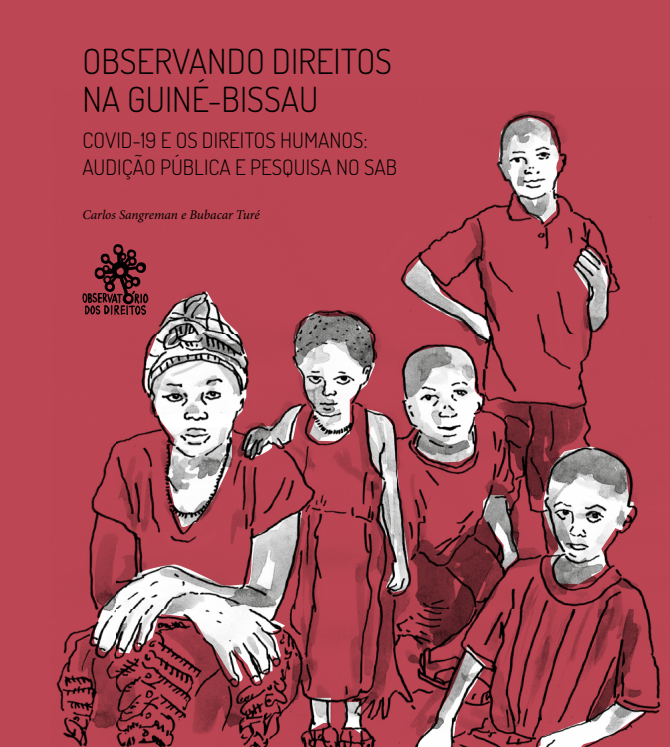
Observando direitos na Guiné-Bissau: Covid-19 e os direitos humanos: audição pública e pesquisa no SAB
Abstract:
Observando Direitos na Guiné-Bissau – Covid-19 e os Direitos Humanos: audição pública e pesquisa no SAB intends to investigate the human rights situation during the Covid-19 pandemic in Guiné-Bissau between January 2020 and January 2022. The framework is based on documentary research on human rights in sub-Saharan Africa from the production of international and specialized organizations, and other non-governmental human rights defenders of the same period. For Guiné-Bissau, in addition to equal research, the communiqués and official bulletins of the “Hight commissariat for Covid-19” were also collected with the information of infected, hospitalized, recovered, deaths and vaccinations, as well as interviews with the newspapers of the Commissioner and the Secretary. With the concentration of cases in the capital, Bissau, the research organize a survey of families, of market sellers and of companies on the effects of the pandemic and the measures enacted by the Government/Presidency to contain. A public hearing was also organized in the House of Rights, with various entities ranging from the High Commissariat to Unions, journalists, and public order police to information about how each institution through its situation and action in this period. As conclusions of the analyses of all these qualitative and quantitative data, it is possible to affirm that Guinea-Bissau’s fragility has such a weight in Guinean society that a disease that has killed fewer people in the country than malaria, diarrhea or tuberculosis has not overlapped with problems arising in poverty and low incomes in general. It affected Human Rights by showing that it was already knew about the enormous shortcomings of the health system, but the effects were more graves on economic and social rights by the abrupt stagnation of economic international activity, the cooperation project, unemployment, and the rise of poverty than directly by the pandemic and measures adopted. The human rights of first generation, more political, freedom of the press and demonstration were affected, with arbitrary arrests and violence practiced by unidentified individuals intensifying the climate of impunity and feeling that the regime is becoming increasingly repressive, but it cannot be said that they were effects directly arising from the pandemic.
Quotation:
Sangreman, C., Turé, B. (2022). Observando Direitos na Guiné-Bissau – Covid-19 e os Direitos Humanos: audição pública e pesquisa no SAB. pag.93. Lisboa: ACEP, com LGDH e CEsA. ISBN 978-9898625-27-4





